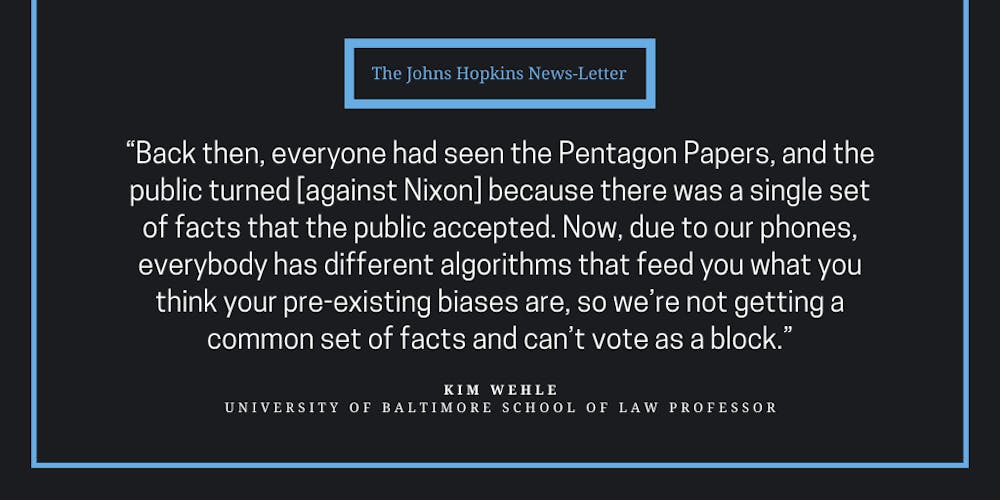The Stavros Niarchos Foundation (SNF) Agora Institute and the Center for Social Concern (CSC) hosted an event titled “Presidential Pardon Power: Where is the Limit?” on Wednesday, Oct. 9. As part of an ongoing discussion series tailored for engaging undergraduates in political issues, the event featured a discussion between Kim Wehle, a professor at the University of Maryland Law School and a legal contributor for ABC News, and Emily Zackin, a political science professor at Hopkins, about the contents of Wehle’s new book Pardon Power: How The Pardon System Works — And Why.
In an interview with The News-Letter, senior Nihal Chatra highlighted the importance of the event in the context of the upcoming election season.
“[The pardon power question] is really pressing at any time, especially now. Voting, if you are able to, is really important,” he said.
Inspired by recent political events, such as the pardoning of the Jan. 6 insurrectionists and the potential self-pardon of former president Donald Trump, as well as a New York Times article she read, Wehle wanted to inform citizens about the history and evolution of pardons.
"There was an article that said the pardon power was absolute, and I thought that can’t really be right [...] due to checks and balances, so I began research and wrote an op-ed,” she explained.
The discussion formally began with the political history of pardoning. Wehle explained how The Code of Hammurabi and the common law of England emphasized mercy and amnesty, setting the foundation for pardoning policies in the U.S. today.
Wehle pivoted to discussing issues with the current pardon system, despite its constitutional limits. While pardons were initially put in place to allow low-offense criminals to restart and contribute to society, now pardons are instead associated with favoritism and corruption.
“[In modern times], the use of the pardon for your own self-interest or for bribes has become frequent. Donald Trump had 11,000 pardon applications and gave 60% of them in the last few days of office, where people with access, money and influence were at the top of the list,” she said.
This perception of favoritism is not unique to Trump’s presidency. Wehle reminded the audience that the limits of the pardon power, especially regarding presidential self-pardons, have been questioned before when Gerald Ford pardoned Richard Nixon after the Watergate scandal.
Wehle emphasized the role of the media and public opinion in eroding the traditional checks on presidential power. In the past, scandals like Watergate could lead to widespread public outrage, creating pressure for accountability. However, in today’s media environment where people consume news through personalized algorithms and echo chambers, the landscape has changed dramatically.
“Back then, everyone had seen the Pentagon Papers, and the public turned [against Nixon] because there was a single set of facts that the public accepted,” she explained. “Now, due to our phones, everybody has different algorithms that feed you what you think your pre-existing biases are, so we’re not getting a common set of facts and can’t vote as a block.”
Toward the end of the event, Zackin asked Wehle about potential reforms to the presidential pardon power. Wehle offered several proposals, including the creation of an independent pardon commission to oversee the process, rather than leaving the decision solely to the discretion of the president.
Another suggestion was to amend the Constitution to place clearer limits on the pardon power, ensuring that it cannot be abused for personal gain or to protect individuals close to the president.
Wehle emphasized the importance of civic engagement and public participation in holding the pardon power accountable. Using a speed limit analogy, she noted that laws alone are not enough to enforce accountability; it is the consequences of violating those laws that give them meaning.
“It’s not the speed limit that makes us slow down necessarily; it’s the consequence for violating the speed limit that gives it meaning. While these norms [for controlling the president] are eroding, the limit becomes useless,” she added.
In an interview with The News-Letter, senior Dennis Plotnikov expressed his takeaways from the discussion on the history of pardons and current issues.
“This talk featured a lot of facts I haven’t thought about before... An important idea is that you can’t ever sit too comfortably in a democratic system; it’s a system of constant maintenance,” he said.





